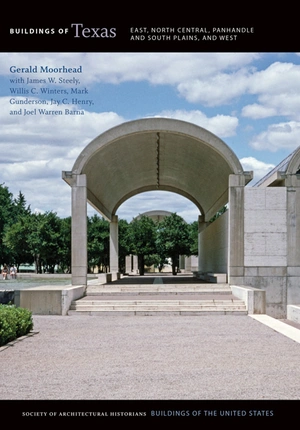
The most ornate and the best preserved of Henry Trost’s extant West Texas hotels is the Hotel Paisano, built for Charles Bassett’s Gateway hotel chain. The sixty-five-room, U-shaped, two-story concrete-framed building is decorated with exuberant cast-stone Spanish Colonial detail. A parapet capped with two rows of red barrel tiles conceals the flat concrete roof. The Paisano’s main entrance within the “U” on Texas Street features a one-story, five-arched arcade wall joining the hotel’s two wings and framing a tile-lined courtyard with a central fountain. The hotel’s entrance porch is scenographic with finials, cartouches, and volutes. On each side of this ornamental display are ground floor commercial spaces. Inside the ground floor the walls are lined with brown, ocher, and yellow tiles, the floors are of patterned tile, and the ceilings are set with plaster-covered beams painted to resemble decorated wood.

